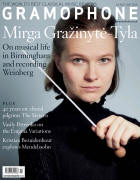Texte paru dans: / Appeared in: |
|
|
Outil de traduction (Très approximatif) |
|
|
Reviewer: Rob Cowan There are interesting aspects to this set, the first to strike me being the resonant acoustic of the Österåker Church in Sweden, which makes for a special sense of atmosphere. This possibly also had some bearing on Jaakko Kuusisto’s choices of tempo – in the last movement of the Third Partita, for example, which, though nicely phrased, is quite measured in comparison with, say, the more vivacious Isabelle Faust (Harmonia Mundi, 6/10, 11/12). Another point is Kuusisto’s employment of vibrato, which is fairly intense at the start of the First Sonata (though not as emotively charged as Hilary Hahn on her recent recording – Decca, 11/18), whereas Faust and Alina Ibragimova (Hyperion, 11/09) favour a cool, tremor-free line. On the other hand, in the opening Allemanda of the First Partita, Kuusisto too dispenses with vibrato. Rhythm provides another interesting point for discussion, the way Kuusisto underlines the siciliano flow of the G minor Sonata’s third movement; here Hahn, like Heifetz many years before her, is more intent on stressing the music’s expressive potential, and returning to her recording reinforces my high assessment of it. When it comes to dynamics Kuusisto is at his most impressive in the sonata finales, the G minor and C major especially. In the latter’s great Fugue I found the opening minutes refreshing in their gentle sense of play but, come the inversion (5'28", again with some vibrato admitted), the music sounds rather more laboured. Conspicuous stresses seem to be something of an issue, such as the opening chords of the E major Partita’s Bourrée and their subsequent appearance later on. Listen to Faust and that sense of ‘tugging’ is entirely absent. No big deal, but I found these gestures mildly distracting. So a nice set that yields much tellingly observed detail. Were you to chance upon these monumental works for the first time in the company of Jaakko Kuusisto, you certainly wouldn’t be short-changed. But at the final reckoning, among digital contenders in the complete set, Faust, Ibragimova and, for a period-instrument option, Giuliano Carmignola (DG, 2/19) are all in my view preferable, certainly as first ports of call. As to vintage options, Heifetz (RCA), Milstein (Warner or DG), Szeryng or Grumiaux (both Decca) will offer countless hours of pleasure, one way or the other. |
|




